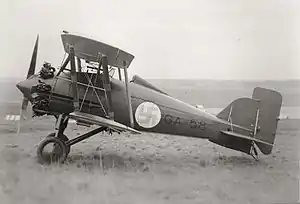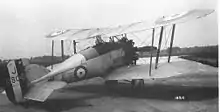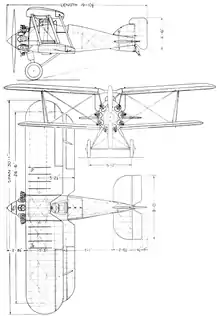Gloster Gamecock
The Gloster Gamecock was a biplane fighter of the Royal Air Force, a development of the Mk III Grebe, that first flew in February 1925. It differed from the Grebe primarily by way of its Bristol Jupiter engine, which replaced the unreliable Armstrong Siddeley Jaguar. Other changes included improved ailerons, refined fuselage contours, and internally mounted machine guns.
| Gamecock | |
|---|---|
 | |
| Gloster Gamecock operated by the Finnish Air Force | |
| Role | Fighter aircraft |
| National origin | United Kingdom |
| Manufacturer | Gloster |
| First flight | 22 February 1925 |
| Status | Retired from service |
| Primary users | Royal Air Force Finnish Air Force |
| Number built | 108 |
| Developed from | Gloster Grebe |
| Variants | Nakajima A1N |
The Gamecock Mark I entered service with No. 23 Squadron RAF at RAF Henlow in May 1926 and they were also the last of six squadrons to operate the fighter until July 1931.[1] This was a fairly short RAF service life, partly because of its high accident rate – of the 90 operated by the RAF, 22 were lost in landing or spin accidents. These faults were remedied in the Mk. II version, utilizing a longer upper wing and a modified tail unit.

During the Finnish Winter War 1939–40, a Gamecock was used to capture a Soviet Ilyushin DB-3 bomber. On 29 January 1940, the Finnish Gamecock strafed two Soviet DB-3s when they landed on Finnish soil (which they mistook for Estonia) to transfer fuel from one plane to the other. The strafed crews hurried into the one plane which had enough fuel remaining and escaped, leaving the DB-3 behind to be captured by the Finns.[2]
Variants
- J7497
- Prototype to Air Minstry Specification 37/23 powered by a Jupiter IV engine and first flown in February 1925.
- J7756
- Prototype with Jupiter IV engine.
- J7757
- Prototype with Jupiter VI engine.
- Gamecock Mk I
- Production single-seat fighter aircraft for the RAF, 90 built.[3]
- Gamecock Mk II
- Single-seat fighter aircraft with revised wing and tail. One new-built for RAF with another Mk I converted to Mk II standard.[4] There were three exported to Finland in 1928, with a further 15 built under licence in Finland from 1929–1930 as the Kukko. The type remained in Finnish service until 1944.[5]
- Gamecock Mk III
- One RAF Gamecock Mk II modified with lengthened fuselage for spin trials.[6]
- Gambet
- A carrier-based version of the Gamecock produced as a private venture. Manufactured under licence for the Imperial Japanese Navy as the Nakajima A1N; about 150 were operated from 1929 to 1935 and saw combat during the Shanghai incident in 1932.[7]
Operators

- Royal Air Force[9]
- No. 3 Squadron RAF - August 1928 to June 1929[9]
- No. 17 Squadron RAF - January to September 1928[9]
- No. 19 Squadron RAF - One Gamecock used only.[9]
- No. 23 Squadron RAF - May 1926 to September 1931.[9]
- No. 32 Squadron RAF - September 1926 to April 1928[9]
- No. 43 Squadron RAF - March 1926 to June 1928[9]
- No. 2 Flying Training School[9]
- No. 3 Flying Training School[9]
- Central Flying School[9]
- RAF College, Cranwell[9]
- Home Communications Flight[9]
Specifications (Mk. I)

Data from The Era-Ending Gamecock [10]
General characteristics
- Crew: 1
- Length: 19 ft 8 in (5.99 m)
- Wingspan: 29 ft 9.5 in (9.081 m)
- Height: 9 ft 8 in (2.95 m)
- Wing area: 264 sq ft (24.5 m2)
- Empty weight: 1,930 lb (875 kg)
- Gross weight: 2,860 lb (1,297 kg)
- Fuel capacity: 50 imp gal (60 US gal; 230 L)
- Powerplant: 1 × Bristol Jupiter VI 9-cylinder air-cooled radial piston eninge, 425 hp (317 kW)
- Propellers: 2-bladed Watts wooden fixed-pitch propeller, 9 ft 0 in (2.74 m) diameter
Performance
- Maximum speed: 155 mph (249 km/h, 135 kn) at 5,000 ft (1,524 m)[11]
- 145 mph (126 kn; 233 km/h) at 10,000 ft (3,048 m)
- Range: 365 mi (587 km, 317 nmi) [12]
- Endurance: 2 hours 30 minutes
- Service ceiling: 22,100 ft (6,700 m)
- Rate of climb: 7,066 ft/min (35.90 m/s) at 1,000 ft (305 m)
- Time to altitude: 10,000 ft (3,048 m) in 7 minutes 36 seconds
- Wing loading: 10.8 lb/sq ft (53 kg/m2)
- Power/mass: 0.15 hp/lb (0.25 kW/kg)
Armament
- Guns: 2×0.303 inch (7.7mm) Vickers machine guns
See also
Related development
Related lists
References
Notes
- "Aircraft of the Month: Gloster Gamecock". www.tangmere-museum.org.uk. Tangmere Military Aviation Museum. September 2008. Retrieved 15 May 2015.
- Keskinen, Stenman,Niska: "Venäläiset pommittajat /Soviet bombers"
- James 1971, p.350.
- James 1971, p.119.
- James 1971, p.121-122.
- James 1971, p.118.
- Gustavsson, Håkan. "Nakajima (A1N) Type 3". Håkans Aviation page. Retrieved 15 May 2015.
- Green and Swanborough 1983, p. 62.
- Lumsden and Thetford 1993, p. 113
- Green and Swanborough 1983, p.7.
- Thetford 1957, p.223.
- Taylor 1989, p.421.
Bibliography
- Green, William and Swanborough, Gordon. "The Era-Ending Gamecock". Air Enthusiast, Number 21, April–July 1983.Bromley, Kent:Pilot Press. p. 1–8, 58–62. ISSN 0143-5450.
- James, Derek N. Gloster Aircraft since 1917. London: Putnam, 1971. ISBN 0-370-00084-6.
- James, Derek N. Gloster Aircraft since 1917. London: Putnam and Company Ltd., 1987. ISBN 0-85177-807-0.
- Lumsden, Alec and Thetford, Owen. On Silver Wings: RAF Biplane Fighters Between the Wars. London: Osprey Aerospace, 1993. ISBN 1-85532-374-5.
- Taylor, M.J.H. (editor) Jane's Encyclopedia of Aviation. London:Bracken, 1989. ISBN 1-85170-324-1.
- Thetford, Owen. Aircraft of the Royal Air Force 1918–57. London:Putnam, First edition 1957.
- Gloster Gamecock – British Aircraft Directory
External links
| Wikimedia Commons has media related to Gloster Gamecock. |